![]()
The Chinese Peasant Study - On The Eve Of The Verdict
The following is an English translation from a Chinese-language featured article published in the Ming Pao Weekly supplement MPW, Issue Number 1878, November 6, 2004.
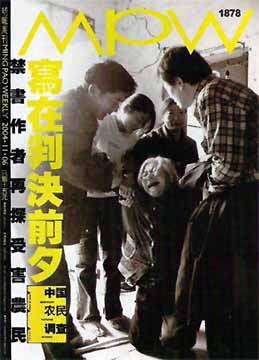
The Reporter's Preface
Never in my life have I ever seen so many people get down on their knees. Afterwards, I am still feeling bad. Especially for that old lady whose two sons died. She came over slowly with a cane to assist her, and then she burst in tears and knelt down before us. When we got her to rise, her face was covered with tears.
In October, the autumn wind was blowing in Anhui province. Our reporter accompanied the two authors of <<Survey of Chinese Peasants>> to visit a peasant village. We went to the one known as The Village Of Evil Men. If you come to this village, as soon as you hint that you can help them, the peasants will get down on their kneels in front of you!
Actually, this is a common sight in Chinese peasant villages.
Every time that someone kneels down, there is not only an infinite gratitude but also a strong sense of worthlessness among the peasants. Heaven and earth are vast, but they are especially insignificant.
Faraway from the affluent coastal cities, we enter into the typical Anhui peasant village. We went through the small villages and we saw the occasional water buffalo. We saw many homes, and most of them are decrepit and in need of repair; we met many peasants and their teeth were yellowed and blackened; we spoke to the peasants, but most of them spoke only Anhui dialect; if we attempted to hand out business cards, they shook their heads and said they are illiterate; the situation in the Chinese peasant villages and the opulence of Shanghai are as different as heaven and earth. The sad situation of the Chinese peasant villages are once again in the limelight. No matter whether the book <<Survey of Chinese Peasants>> was accurate or not, this book certainly had the courage speak out on behalf of the peasants by describing a number of incidents that involved the miscarriage of justice Yet why is it that when the 80's enriched the coastal villages, the inland peasant villages are falling behind in the 21st century?
Chapter 1. On The Podium Of The Lettre Ulysses Award

On stage to receive the Lettre Ulysses award,
both authors said their book is intended to remind officials
to consider the welfare of the people
and to confront the problems.

Within the bookstores and cultural units of China,
the book cannot be sold,
but pirate editions are available on the street
"Things that are removed too far from life does not have much liveliness."
Chen Guidi and Chuntao received the Lettre Ulysses award, which is regarded by some people as the Nobel Prize for reportage literature. The award is organized by the Lettre International magazine, and this is the second annual occasion. There are three awards: the first, second and third prizes. <<Survey of Chinese Peasants>> won the first prize. At the beginning of October, the two authors were invited to Berlin to receive the prize. On the podium for the Lettre Ulysses award, the jury declared that the significance of this book is that it revealed the structural causes of the problems of Chinese peasants through real individual stories.
The amusing thing is that <<Survey of Chinese Peasants>> is banned in China, but there are pirate copies in circulation. So when Chen Guidi and Chuntao received the prize in Germany, the copies of the book displayed were pirated ones.
The Lettre Ulysses award brought 50,000 euros (equivalent to about 500,000 Hong Kong dollars) to the authors. The two authors joked that if they lose their lawsuit, then the money would have to use to pay the damages. The fourth chapter of the book cites the official Zhang Xide, who has suited them for making libelous statements and damaging his reputation to the tune of 200,000 yuan. If that amount is deducted, then there is more than 300,000 yuan left.
On that day, the eyes of the ever gentle and lively Chuntao turned even gentler. Her big eyes were swelling with tears and she was choking while she spoke. When they returned from Berlin with the Lettre Ulysses award back to their home in Anhui and the award was placed on their bookshelf, should she and her husband not be happy? She cried because of the tragedy that befell a peasant woman four years ago. "Because of her, I made the decision to write these stories about peasant villages ..." Although she did not cry out loud, she could not continue.
"Her" story, just like many of the other stories about peasant families in <<Survey of Chinese Peasants>>, may be so common that people have become desensitized by now. But for each of the encounters or deaths of the peasants in the book, Chen Guidi and Chuntao went into the peasant villages to investigate, they spoke to officials to get clues and they interviewed the retired villager heads or secretaries in order to find out about the causes. Why did they die like that? Why do they have to pay all those messy miscellaneous taxes and fees? Then they went to Beijing to interview economic scholars, agricultural experts and sociologists to get their opinions.
"Actually, this type of work should not be done by us. Since nobody wants to do it, we end up doing it." Sitting beside Chuntao, Chen Guidi said: "We are willing to stay at a place for a long time. We are writers and we are not supervised by newspapers. Reporters don't have the time to do this."
Chen Guidi and Chuntao used to write creative literature. In the last ten years, their reportage literature are done in a narrative manner. Chuntao believes that reportage cannot be used to inflame emotions. How do you know what people really think inside? So with these restrictions, then why not become creative writers? It is not that it is bad, but "there are too many problems that no one looks at in China. Reporters are constrained by the guidelines given by the editor-in-chief and there are many things that cannot be published. Reportage can cover many stories that the reporters are unable to. We are responsible for what we write. In recent years, we feel that things that are removed too far from live does not have any liveliness. We think reportage is substantive and full of life."
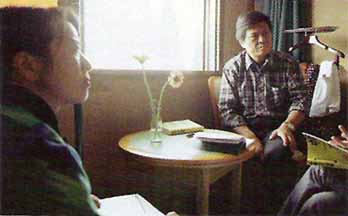
Chapter 2. The Decision To Begin The Investigation Was Made In The Maternity Ward
Without "her" story, there might not have been a <<Survey Of Chinese Peasants>>. Chuntao has always suffered a case of high cholesterol. When she was seven months pregnant, she had to enter the hospital in her hometown of Henan to await delivery. By eight months, her body was swollen everywhere and her doctor told her that the baby must be delivered a month ahead of time in order to save it. Yet not every pregnant woman can afforded to stay in a hospital when she has a complication and to get an operation if necessary. During this time, there was a peasant woman in the next room who was there due to hemorrhaging. The doctor wanted her to pay 3,000 yuan, so she had to leave the hospital because she had no money. The woman went back to her village 30 kilometers away, where it only costs 200 yuan to deliver a boy and 100 yuan for a girl.
After some days, Chuntao heard a large cry in the next room. There was a man banging his head against the wall and the ground. Chuntao went to see what happened, and found out that the woman had gone home to deliver the baby and began to bleed incessantly. When she was finally sent to the hospital again, it was too late and both mother and baby died. As Chuntao retold the story, she was still feeling bad: "Two lives were gone for lack of 3,000 yuan. What are the peasants so poor? I felt bad. It was she who firmed up my determination."
Afterwards, Chuntao told her own story. "My mother and I used to live in a peasant village. At 11, I went to work in the fields. We had two pigs in the family . Then my dad who was a crane operator died in an accident. His crane could carry 5 tons, but he was actually carrying 9 tons at the time. The car and him toppled down a slope." From that time, her mother took over her husband's hukou and she went to work in the city with her child. From that time on, their lives improved. Chen Guidi had plenty of criticisms on the problem of switching from a rural hukou to an urban hukou.
Xiao Yuan was born on March 2, 2000. It was at that time that the central government issued the document <<Notice Concerning The Major Points On Tax Reform In Peasant Villages>>. At the time, Hunan Province Jianli County Jipan Village party committee Li Changping wrote letter to the State Ministry that shocked the nation: "The peasants are truly suffering, the peasant villages are truly impoverished and peasant agriculture is truly in danger." This motivated Chen Guidi to begin his investigation. In 1993, he began to write reportage. His <<The Warning On Huaihe> recorded the pollution of the Huaihe and he told people: "We will be punished for polluting Huaihe, and severely so." After that, he turned his attention to the reportage of the realities of peasant lives.
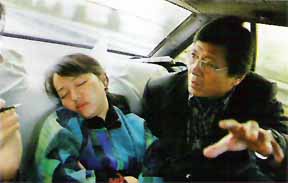
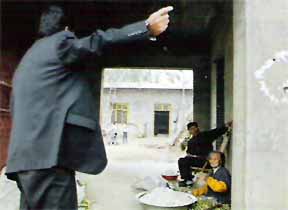
Chapter 3. Leave The Son Behind And Take To The Road To Write The Book
When Xiao Yuan was seven months old, he was left in the care of a woman in the neighborhood. The two authors then packed and got on the road: why didn't one go and the other stay behind? Chuntao was the designated person to answer these detailed questions: "If he gets on the road by himself, then I am worried. If I go along, I can keep an eye out on things. He tends to be get emotional about injustices, and that gets him into trouble."
When they were investigating the peasants' problem, they did not have much savings. Through frugality, the total costs of their travel and living expenses over three years was only 50,000 yuan. This is, each person could use 700 yuan per month. Both of them are members of the Cultural Union, so when they can count on having some income whenever they returned home.
For less than 700 yuan per month, they went to more than half of the peasant villages in Anhui province. The trick was that they knew how to stay in the country inns (=刀馬店). These are ancient inns that typically lie right on the border between two countries. Automobiles and animals can stay there. But what about the people? They also go and sleep on the long communal bed, men and women, for eight to ten yuan per night. "As for those blankets, you shouldn't think about whether they are clean or dirty. Just go to sleep," Chen Guidi said with humor.
As a husband-and-wife writing team working on the same book, the man was responsible for the rational and analytical portions, while the woman was responsible for the emotional and detailed portions. In terms of personality, it was the same as Guidi was the logical one while Chuntao was the emotional one. To finish <<Survey of Chinese Peasants>>, Chen Guidi smashed five remote control devices. Yes, the man liked to take the television remote control and go at it, while the woman likes to sit on the side to talk about her concerns.
"Oh, there was too many quarrels!" said Chen Guidi. Of the five remote control devices, one was smashed over an argument about the name of a particular official. Today said, Chuntao said, "That person was not bad to him. I said, 'Don't write about that person! Why are you always watching television?'" Chen Guidi followed: "How come we can write about everyone else but this person? I said, 'Don't say anything more! You are always saying the same thing!!!'" So he smashed another one in anger. Chuntao laughed and looked at her husband, "The remote control devices cost 25 yuan apiece."
Chuntao explained that she has more worries and she was concerned about the safety of the family and the child. Here, the name Xiao Yuan is a pseudonym. He is four years old, and he is never photographed. Chen Guidi is a tough person. He was a dockworker at Huaihe, and he carried merchandise weighing over 50 kilograms over the planks. He was also encountered lots of tough people. He said: "My toughness grew out of those days." It is rare to see an intellectual who is so gregarious.
As for the events that they covered in the peasant villages, everyone has their own little stories. So how does one determine what is true or false? Chen Guidi is used to writing reportage, and he has his own method of collecting and verifying information. He will not listen to one person because he wants to listen to many people in order to determine the truth. He will go to the county-level, the provincial agricultural committee and the media to collect materials, and he will go to the court to read the verdict statements. Whenever there is a doubt in the information, he will try his best to clear it up. For example, when they were reading the provincial, county and village investigative reports about the April 2, 1994 incident at Linguan County Wangying Village in which the peasants were supposed to have attacked the public security officers and smashed their vehicle. Upon reading these reports, Chen Guidi read the county sent more than 100 public security officers and armed police officers to Wangying Village, which had a population of more than 1,000, and yet they only managed to arrest 12 people. He could not understand it. In January 20, 2001, Chen Guidi and Chuntao went to Wangying Village in person during the cold winter, and found out that the village was right next to Henan province. Some people need only jump out of their window, and they would have gone from Anhui province into Henan province. It was small wonder that more than 1,000 villagers were able to escape in time during the moment of danger.
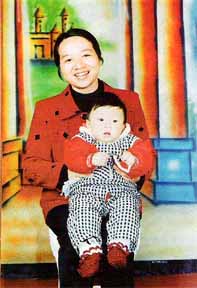
Chun Tao and 7-month-old Xiao Yuan
Chapter 4. Dad and Mom Turned Into Flies and Flew Away!
The research for <<Survey of Chinese Peasants>> began in October 2000 and the book was completed at the end of 2003. It was originally published in <<Dangdai>> magazine. In January 2004, it was given to The People's Literature Publishing House for publication. The book banned in March. After completing <<Survey of Chinese Peasants>>, they went and took Xiao Yuan back home.
It was only at that time that the parents saw that they have missed several important years in the live of Xiao Yuan. Actually, they alternated between investigation and writing. After doing investigation, they came back for Xiao Yuan so they can write together. It was at that point that they realized that Xiao Yuan, who was more than two years old, did not know how to call his dad. Xiao Yuan only knew some single words. The female neighbor was very nice, but she did not speak a lot. From there on, Chuntao would still go on the field research trips into the villages. But if there is need to visit scholars in Beijing, her husband would take care of it by himself while Chuntao stayed home to let the child see the mother. Chuntao said apologetically: "It was all because my health was poor and the child never had human milk."
When <<Survey of Chinese Peasants>> was near completion, the two authors were proof-reading. Xiao Yuan was more than three years old by now. One day, a friend published a book about children's education and gave them a copy for their reference. They read the book and ... oh no! ... Xiao Yuan did not appear to have any of the skills for a three-year-old. "The friend said that we were too selfish," said Chen Guidi. "We felt very pained inside." To make up, whenever the three of them are together, the adults tried their best to stay home. Dad and mom are writers who hold pens all the time. At home, the three of them would be using their pens to either write or draw. What was Xiao Yuan drawing? He would imitate his parents' tone of voice: "Mom, I am thinking about things, so please don't bother me."
In the past, when they have to go out to do field research, they would ask their female neighbor to take Xiao Yuan out on the verandah. After a while, Xiao Yuan learned that going out on the verandah means that his parents are leaving. Today, Xiao Yuan is being taken care of elders. Whenever the two go out, "even if it is to buy tea leaves," says Chuntao, "Xiao Yuan would panic. On the day when this reporter visited, even when Chuntao make as if she wanted to get out of the chair, Xiao Yuan would ask: "Mom, where are you going?" Xiao Yuan will have to be separated from his parents again. The two of them felt that they have crossed a lot of people in <<Survey of Chinese Peasants>> and they were concerned about the safety of the child enough to send him away. Every time that they meet again, Xiao Yuan would ask, "Mom, how did you leave?"
"We turned into a fly and we flew away."
"Then I want to become a fly too."
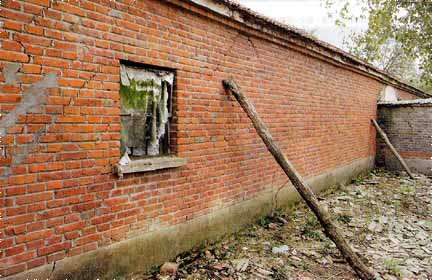
Chapter 5. The Story of the Four Dead People in Xiaozhangzhuang
The two authors have personally visited all the books mentioned in <<Survey of Chinese Peasants>> except that they could not enter Xiaozhangzhuang, the village cited in Chapter 2. All interviews there were conducted by asking the interviewees to meet them outside the village. At the time, some of the members of the family of the vice-mayor had been convicted, but there still other members of the family in the village.
This time, Chen Guidi and Chuntao entered Xizozhangzhuang for the first time. It is not easy to find Xiaozhangzhuang because not a lot of people know the name. But if you tell someone that you are looking for the village in which four people were killed, then everyone can point out the way for you.
In 1997, Zhang Guichun (who was the vice-mayor of Xiaozhangzhuang) knew that the country had requested for the same amount of maize levied on the peasants as in 1996, but he nevertheless imposed 25 extra kilograms per person. In order to increase his own wealth, he found many ways of making money. He had the "five taxes and one fee" for him to get money from various miscellaneous reasons. If any family has a pig, they have to pay 45 yuan; if any family had a new house, they had to pay 150 yuan. It was all based upon his personal say-so. <<Survey of Chinese Peasants>>, p.37.
In the face of these illegal acts by the village cadres, the villagers of Xiaozhangzhuang did not also obey passively. Zhang Guiyu, Zhang Hongchun, Zhang Guimao and Zhang Jiachun were several righteous men who were determined to get an accounting of the village finances and reflect their opinions to the village party committee and the village party secretary. In the spring of 1997, villager Zhang Jiachong even sent a letter to the Guyuan County Prosecutoriate. <<Survey of Chinese Peasants>>, p.35.
Zhang Guichun came with his fifth son Zhang Yuliang and his seventh son Zhang Loyi and showed up at the door ... then came the village accountant Zhang Jiachun and his son Zhang Jue ... immediately Zhang Zhaohui assaulted Zhang Guiyu ... Zhang Guiyu was taken by surprise, and fell heavily on the ground before he could say anything. <<Survey of Chinese Peasants>>, p.35.
The Follow-up Investigation: October 17, 2004
As soon as the authors entered the village, they asked people to bring them the wife of Zhang Guiyu. A peasant woman hurried over quickly and knelt down in front of the two authors. She had seen with her own eyes that her husband and three other peasant representatives were beaten to death. The murders at Xiaozhangzhuang took place in January 22, 1998, but it was still very sad for Zhang Guiyu's wife Suyong.

"They killed my husband. What can I do? I am illiterate. I only know how to farm. Our three children have grown up now, with the smallest being 16 years old." The villagers do not speak putonghua well and very few are literate. Suyong used a mixture of Anhui dialect and putonghua to speak to the reporter, so her meaning is barely understood. "When my husband died, the children were still little. The village asked me to turn in the food quota but I did not. At the time, my eldest son Zhang Xiaochong was only 15 years old, but they slashed him on the shoulder with a knife. It took a long time to heal." Today, Zhang Xiaochong is more than 20 years old. We did not see him on this day because Suyong said that he is working in town.

Chapter 6. Zhang Guiyue (the elder brother of Zhang Guiyu)
When Zhang Guiyue heard that his younger brother Zhang Guiyu was being set upon, he was angry and despondent. He grabbed a pole that he used to stir grass for the cow and he raced over. But his eyesight was bad and he came all the way until he was right up to Zhang Jiazi (the eldest son of the vice-mayor of the village). Then he saw his younger brother lying on the ground. He said, "Isn't that Guiyu?" Before he even finished saying that, Zhang Jiazi's murderous knife plunged into his chest. <<Survey of Chinese Peasants>>, p.36.
The Follow-up Investigation: October 17, 2004
Zhang Guiyue also had three children. After his death, there was no principal wage-earner in the family. The little daughter Zhang Yong is a student, and is 16 years old. Her father never had the chance to see his daughter grow up. About the murders at Xiaozhangzhuang, she recalled that she was only 10 years old at the time. She got up early in to morning to go to school. When she got home in the evening, her father was absent. She saw that her mother and other adults of the family looking very sad and knew that something big had happened.

Zhang Yong has written to the Education
Department
about the murder of her father
"I have never seen my father since that day!" As she spoke, she took out the documents that the villagers sent to complain to the government units about the murders. Her mother said, "I am illiterate." Zhang Yong continued: "My father's ashes is still at the crematorium and we have not been able to get it back." What was to be done? Someone said in Anhui dialect that the matter is still not settled because up to now, the government had been treating this as a peasants vs. officials fight and not as a case of murdering peasants. But Zhang Guikong said that verdicts have been rendered in this case, and since the people are dead for many years, it is time to think about compensation instead.
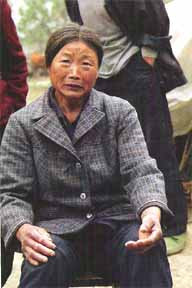
Zhang Guiyue's wife brought up their three
children
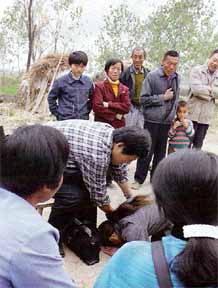
Begging Chen Guidi for help
Chapter 7. Zhang Hongchun
When peasant representatives Zhang Hongchun and Zhang Guimao heard the commotion and raced over, they saw Zhang Guiyu lying still in a pool of blood. Zhang Hongchun angrily confronted Zhang Guichun: "How can you be so evil? Take these people to the hospital as quickly as possible!"
The fifth son of the village vice-mayor Zhang Yuliang was closest, and he rushed over immediately and stabbed Zhang Hongchun several times in the chest, belly and buttocks. Zhang Hongchun did not even have the change to resist, and he was already down on the ground. <<Survey of Chinese Peasants>>, p.35.
The Follow-up Investigation: October 17, 2004
After Zhang Hongchun was murdered, his wife remarried. There were two sons who were eleven and twelve at the time, one of them was known as Big Boy and the other as Tall Boy. Big Boy is the older son and he is twenty years old now. The villagers say that he is feeble in the head. Anyway, you can see in the village that if people tell him to walk, he'll walk; if people tell him to stand, he'll stand. He is a mentally defective person. But he is handsome looking and follows orders.

Tall Boy and Big Boy at home, with a photo of
their deceased father
During the last six years, Big Boy and Tall Boy had no one to look after them. After the case was finalized, they were sent to live in a retired persons' home.
Following the coverage by various media, especially by several nationally influential newspapers and magazines, it was no longer possible to put the lid on the truth about the murder of the peasant representatives of Xiaozhangzhuang for exercising their civil rights. Then the tide turn. The Tangnan Village government sent the two orphans of Zhang Hongchun to live in the retired persons' home at the village. <<Survey of Chinese Peasants>>, p.55.
Neither one of them had gone to school. When Tall Boy saw the reporter, he said that he had attended first year in grade school. Then he showed the reporter his home. He said: "I am a grown-up now, so I cannot live at the retired persons' home anymore. I have to come back to this home. My brother will continue to stay at the retired persons' home." This house was incredibly broken down, looking as if it might fall down at any moment! He wants to do farming. Suyong interjected: "His family does not have a tractor. He does not even have a cow. We can only each take turns to help him farm a bit, and take it slowly."

The decrepit home of Tall Boy
Chapter 8. Zhang Guimao
At the moment when Zhang Yuliang (the fifth son of the vice-mayor of the village) set upon Zhang Hongchun, Zhang Guichun threw away his umbrella and grabbed hold of Zhang Guimao who was attempting to save people. According to the pathologist's examination: Zhang Guimao was hacked five times in the head, with wounds that were so deep that the head bones were visible. The skull was broken and the left lung was punctured, showing how ruthless the murderers were." <<Survey of Chinese Peasants>>, p.36.
On the night after the incident, the entire Xianzhangzhuang was still submerged under the shock and the sorrow. Suddenly, the cable television channel at Guchun County broadcast the news of the incident. According to the report, there was a quarrel among peasant villagers in Xiaozhangzhuang in Tangnan Village of this country, and the verbal exchange led to a serious manslaughter case. The photos showed some "murderous" weapons that appeared to have been retrieved from the scene, but these were the sickle and the kitchen knife that the public security officers confiscated from Zhang Guiyu's home after not being able to find anything at the actual scene. The whole thing was a piece of faked news!" <<Survey of Chinese Peasants>>, p. 40.
When the public trial took place, the families of the victims were not notified officially. When they heard about it and rushed over, they found out that the principal planner and director of the massacre, Zhang Guichun as well as Zhang Jiazi (the son of Zhang Guichun) were both sentenced to death; the sons Zhang Chaohui and Zhang Yuliang, who murdered peasant representatives Zhang Guiyu and Zhang Hongchun, were sentenced to life terms. This was an obvious lack of fairness, because it was clear that the crimes of the two sons were laid to the father. <<Survey of Chinese Peasants>>, p.47.
Afterwards, on the traditional May 5th Chinese holiday, the Guchun County government gave each of the four victim families one hundred yuan as present. <<Survey of Chinese Peasants>>, p.55.
When Zhang Guimao died, his daughter and son were 17 and 16 yeaqrs old. His wife had passed away when the children were still very young. Without the father to farm, the daughter got married and the son went to work as as transport worker at the depot.
The son of Zhang Guimao is one of the few people in the village with white teeth. Many peasants have yellow and black teeth because they drink containminated water and they eat berries. But this son was handsome looking and spoke gently. He does not know putonghua too well, so he sat down in the middle of the crowd to listen Suyong and Zhang Yong talk to us. Then all of a sudden, a sense of tragedy overwhelmed him and he burst out crying. He got down on his knees in front of us, moving everyone else to tears.

The son of Zhang Guimao
We made him get up and he spoke a few words in Anhui dialect. Roughly, he said: "I am illiterate . You help us. My father suffered a pitiful death!"
We asked him to get up because his grandmother would be crying again. Her two sons -- Zhang Guiyu and Zhang Guiyue -- were dead. She had just gotten down on her knees in front of us to complain: "We did not agree to a cremation, but my two sons were cremated anyway!"
It was very sad to hear that.

The mother of Zhang Guiyu and
Zhang Guiyue
being helped up after getting down on her knees
Chapter 10. The Court Case for The Long Road To Petition
In the most striking scene of <<Survey of Chinese Peasants>>, 74 villagers from Wangying Village protested against the increased burden imposed by the county government as well as the illegal and violent enforcement of family planning policy by going to Tienanmen Square and kneeling down en masse. This was related in Chapter 4 of <<Survey of Chinese Peasants>>, and it brought about a lawsuit against Chen Guidi and Chuntao. The person who sued them was Zhang Xide, who was the party secretary at Linquan County Fuyang City Anhui Province and is now the Vice-Chairman of the Political Consultative Committee of Fuyang City. His son Zhang Fei is a judge at the Fuyang City People's Court.
On 24-27 August this year, the case was heard over four days. On August 27, the chief judge declared that a verdict will be announced at a later date. The length of the hearing set a record for civil cases at the Fuyang Intermediate People's Court.
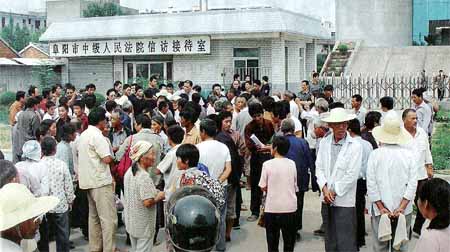
Large number of peasants showed up during the
trial to support the authors
According to a Chinese reporter who attended the hearings in person, the witnesses for the plaintiff Zhang Xide were mostly his former subordinates who had prepared scripts. When the chief judge forbade the reading from the scripts, their testimony became more hestitant. The plaintiff Zhang Xide was prompting his witnesses from his seat, to which the defense raised objections. During these four days, the peasants related their complaints to the reporters. Zhang Xide's car was parked outside the court, but it was surrounded by the peasants and stuck in the crowd. Finally, it took the defendants' lawyer as well as university students who came all the way from Beijing to brief the peasant defendants to persuade them to disperse. At court, a peasant supporter of the defendants as well as an unexpected peasant woman knelt in front of the judge: "May the honorable judges render justice for my family ..."
At the conclusion of the hearing, the defense lawyer Pu Zhiqiang asked: "Let us hypothesize that at the time you were not aware of the sufferings of the peasants of Linquan County nor the evil deeds committed by your subordinates. After these four days of hearing, you should know everything by now. Do you feel guilty and remorseful about your own responsibility as the party secretary of Linquan County?" Zhang Xide resolutely said, "No."
Pu replied, "Then I must admit that the ending of the chapter The Long Road To Petiiton about the remorse felt by party secretary Zhang Xide is inaccurate. The author couple thought that you were a decent person underneath, but your response just told the authors that they were wrong. Therefore, the authors were inaccurate about you on this point."
Why is the verdict not published yet? Why has the case been delayed so long without a verdict? Chen Guidi said, "This case is difficult to handle. We wrote that the burden on the masses were too heavy, and that is true. We have the material proof. We have also visited the various levels. The county refused to solve their problems, so they had to go to Beijing to petition. After that came the actions to suppress the masses because a proper investigation of this case would have dragged in many departments in Fuyang County." According to lawyer Pu Zhiqiang, who spoke to us via long-distance telephone: "A verdict for this case should have been available in ten days."
What happens if they lose? Chuntao and her husband said simultaneously: "We will appeal." Although this lawsuit was a nuisance, Chen Guidi has decided to write a second reportage on the subject of the peasants, and this lawsuit will be part of the backdrop.
Concluding Chapter
"I like tought guys because they are real men."
Chen Guidi and Chuntao met each other at the 1991 Luxun Writing Class. There were 60 people in that class, but many women liked the 49-year-old writer. They all tried their wiles to gain his attention, but this tough guy just spent all day writing. Still, young female writers would drop by this author's room for "advice." At the time, one woman really liked Chen Guidi and so she would bring Chuntao along to visit him. In the end, it was Chuntao who wong the prize. At the time, Chuntao was only 26 or 27 years old.
They got married in 1992. Whether before or after the marriage, Chen Guidi has never sent any flowers. Chuntao said: "He does know how to sweet-talk people. He does not know how to do a thing at home." Chen Guidi does not know how to make noodles or stir-fry food like most Chinese men know, but he offered one exception: "I know how to put the noodles into the water." Chuntao glanced at him coyly and said: "One time, I was really busy so I asked him to help Xiao Yuan put on his clothes. He ended up putting his coat inside out." But, we must add this: we tend to think that Chuntao takes care of Chen Guidi in life, but the truth is quite the opposite. Based upon what we observed, Chen Guidi is a caring person who is gentle and approachable and he is stubborn in a cute way. No wonder Chuntao said: "On the outside, he know how to take care of others. He has a strong sense of responsibility."
What attracted Chuntao is the following: "If someone jumps into a queue, he is going to stop them. I found out that he likes to mind a lot of business." Chuntao may seem to be criticising, but she is actually praising him. "He is not afraid of anything. I like men who accepts their burdens, because they are real men."
Meanwhile the man is not listening carefully to Chuntao talking about him. Instead he was telling the reporter: "Our book should not have been written by us. It should be up to agricultural experts or economists to do so, but our intellectuals are seriously missing in action."
Chuntao quickly added an aside: "He is that kind of old-style intellectual."
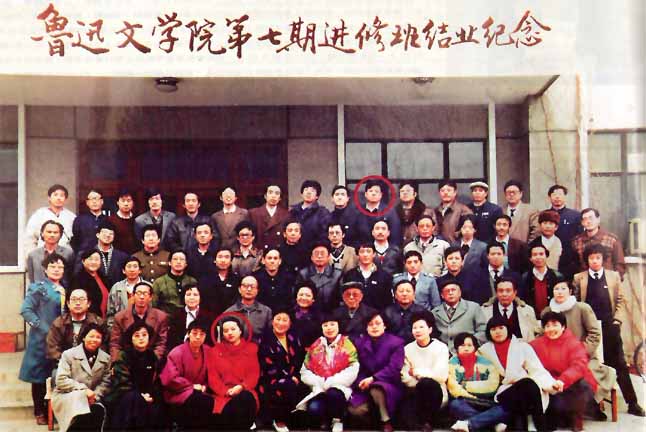
Class photograph of the Seventh Luxun Writing
Class in 1991 with the two authors' faces circled in red.
More related EastSouthWestNorth posts.